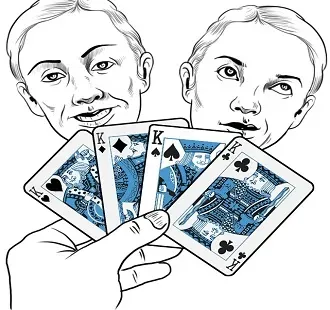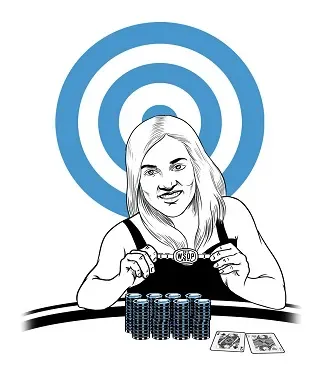The Right Energy for Poker
I’ve repeated the term 'optimal energy level' several times throughout this poker strategy document, and it's time to clarify its meaning. To understand this concept, we can reference scientific principles since it has been extensively studied. The diagram below illustrates the Yerkes-Dodson Law, which depicts how energy levels correspond to performance.–This is a principle that not all poker instructors take into account. If you look at the left side of the graph, where energy levels are low, you’ll notice that performance also suffers. Recall instances when you felt exhausted, unenthusiastic, or simply disinterested—your gameplay likely faltered because you lacked the mental fuel required to engage fully. Conversely, on the right side of the graph, performance can also decline due to excessively high energy, which can lead to mental errors. Just like an electrical circuit that starts smoking from overheating, when you’re overly excited, anxious, or angry, your cognitive function can deteriorate. The pinnacle of this curve represents the perfect equilibrium, akin to the Goldilocks principle in poker energy—neither too much nor too little.
It should be noted that the graphic oversimplifies things, as it suggests that just having the right energy level will ensure you are in 'the zone.' Through recent insights, I’ve learned that it's not entirely accurate. As I hinted at in the opening, your ability to focus, collect data, and make decisions also significantly influence your performance level.
Find Your Ideal Energy
You’ve likely experienced this sensation. You’re neither overly zealous nor sluggish or indifferent. You feel refreshed, energized, and primed to engage at the poker tables. Playing under these conditions is truly enjoyable. The subtleties of poker capture your interest and the challenge motivates you.
 To get back to this ideal poker energy state consistently, you must first recognize what it feels like and identify the factors that led to it. How else can you understand what to strive for? Reflect on your own experiences. What is your energy like when you are performing at your peak? Are you calm, focused, excited, mellow, or somewhere in-between? Many clients express that they simply ‘feel ready,’ as though they are charged up and eager to play. Now consider what contributes to this fantastic energy—things like sleep quality, nutrition, physical activity, motivation, recent playing volume, average buy-in amounts, and your overall preparation. emotional state How did you rest the previous night or over the past few days? Did the meals you consumed influence your energy levels? Did you engage in physical activity before your poker session, and how significant is the type and duration of that activity? Have you reviewed any helpful poker strategies for Texas Hold'em, especially if that’s your preferred version of the game, or any beginner tips? Do the stakes you’re playing at or the toughness of your opponents matter? How do your emotional responses affect your energy? advanced play Keep in mind, having the ideal energy doesn’t guarantee peak performance. You might find yourself easily distracted, perhaps even watching a movie while playing. You may have just finished watching poker training videos, trying to apply unfamiliar concepts in the heat of the moment. Optimal energy can exist without optimal play, so when identifying your best moments, don't overlook the times when your energy was right, but your gameplay fell short.
To get back to this ideal poker energy state consistently, you must first recognize what it feels like and identify the factors that led to it. How else can you understand what to strive for? Reflect on your own experiences. What is your energy like when you are performing at your peak? Are you calm, focused, excited, mellow, or somewhere in-between? Many clients express that they simply ‘feel ready,’ as though they are charged up and eager to play. Now consider what contributes to this fantastic energy—things like sleep quality, nutrition, physical activity, motivation, recent playing volume, average buy-in amounts, and your overall preparation. emotional state How did you rest the previous night or over the past few days? Did the meals you consumed influence your energy levels? Did you engage in physical activity before your poker session, and how significant is the type and duration of that activity? Have you reviewed any helpful poker strategies for Texas Hold'em, especially if that’s your preferred version of the game, or any beginner tips? Do the stakes you’re playing at or the toughness of your opponents matter? How do your emotional responses affect your energy? advanced play Keep in mind, having the ideal energy doesn’t guarantee peak performance. You might find yourself easily distracted, perhaps even watching a movie while playing. You may have just finished watching poker training videos, trying to apply unfamiliar concepts in the heat of the moment. Optimal energy can exist without optimal play, so when identifying your best moments, don't overlook the times when your energy was right, but your gameplay fell short.
To reliably reach your peak energy, I recommend maintaining a log where you note these influencing factors and track patterns over time. This is akin to working with a poker coach or studying your game to identify successful and unsuccessful moments. As you accumulate more insights about your peak energy and its drivers, you can develop strategies or routines to facilitate that energy more frequently. This isn’t overly complicated, yet many players struggle to maintain the necessary discipline, which is a key reason you should consider doing it. Furthermore, several clients have reported an increased ability to reach peak energy levels after addressing the underlying causes for their energy fluctuations.
If you find that your energy has surged too high for effective play, you may be sliding down the right side of the curve, approaching a state of mental overwhelm. It's quite likely that some emotional state—be it excitement, fear, anger, inspiration, or overconfidence—has led you to tip over the edge.
Reduce Your Energy
Learning how to manage and reduce emotional intensity is a valuable skill, one that I explored extensively in my first poker training publication. Here are some condensed points on achieving emotional regulation:
Consider taking a brief pause to regain your composure.
Emotionally Charged Play
Is it intimidation from a formidable opponent, or an inflated sense of confidence due to a winning streak? To gain control over your emotions, you must first comprehend what’s fueling them.
Is it anger from bad beats 2. Before your next playing session, formulate a response to emotional triggers that you can refer to during the game.
Often, the inner dialogue we engage in may exacerbate emotions. For instance, if you feel annoyed after making a mistake, instead of berating yourself with, 'What an idiot! How could I be so foolish?', try a more constructive approach: 'I don’t regularly make mistakes like those seen in wild poker videos unless something is off. Am I feeling tilted, fatigued, or distracted? That’s the mistake I should address.' Or, if you feel nervous when facing a tough opponent, rather than thinking, 'He can read my every thought. I have no chance,' consider reframing it: 'This will be challenging, but if I perform at my best, I can learn something and gain more experience against tough players. Who knows? He might underestimate me, which could create opportunities for me to outmaneuver him.' The most effective corrections are those that get to the heart of the emotion, articulated in your own voice. If you're struggling to devise a response, I will outline a comprehensive poker tilt control method in a forthcoming chapter titled 'An Important Update.'3. While you’re actively playing, notice when your emotions start to escalate, and mentally repeat your corrective statement. Mental Game of Poker You might need to do this several times to calm the emotion down, and you may have to keep reinforcing this reminder throughout your session or tournament. It's often easier for overwhelming feelings to resurface once they’ve taken hold, similar to a pesky fly that just won't leave. Continue to fight this battle; it’s how you maintain emotional balance, achieve better poker energy, and perform effectively.
4. Think about taking a brief timeout to gather your thoughts.While this isn’t ideal since you’ll miss some hands, in the short term, as you work on fortifying your mental resilience, it might be necessary to prevent a major blowout. Indeed, this should be part of your poker strategy. become mentally tough .
Even when your energy dips below optimal levels, you can employ strategies to elevate it. Regardless of whether exhaustion stems from boredom, fatigue, or a nutritional slump, there are techniques available to elevate your emotional state and energy back up toward the left side of the curve.Here’s some complimentary poker coaching to illustrate how:
Boost Your Poker Energy
1. Investigate the reasons your energy is waning.
Are you feeling lethargic because you've had a streak of bad cards, exhausted from hours of non-stop play, or in a food coma from the large meal you just ate? While these factors can be improved by the forthcoming tips, recognizing the cause of your low energy will help you gauge how long you can expect to boost it before needing a break.

These can range from short-term goals for the current session or tournament to long-range aspirations for the upcoming year or further down the line. For example, if your objective for the session is to maintain composure and avoid tilt, your motivation (beyond the financial implications) could be your frustration with losing control, as you want to demonstrate that you can stay grounded. Suppose a larger, long-term goal for you is to win a WSOP bracelet. Write down why that accomplishment is significant for you. Is it about monetary gain? Personal prestige? Gaining recognition as a top player? Or perhaps to prove to your family that poker can be a legitimate pursuit? Whatever your ambition, there’s always a deeper reason behind it, and you can lean on that to invigorate your energy.
3. While engaging in play, recognize the initial signs of energy decline and mentally reaffirm your goal and its significance.The next time you start to feel fatigued and contemplate quitting, this mental exercise could be the motivating factor that helps you stay at the tables and push through to complete a productive session. If you repeat this enough, it can significantly affect your ability to achieve your goal. Similar to managing heightened emotions, you may need to periodically remind yourself of your objectives and their importance during your session or tournament.
4. Enhance your poker strategy and ramp up your energy levels when they fall.Being aware of your diminished energy can paradoxically sap even more vitality. Acknowledging your fatigue can become a mental excuse, sometimes subtle enough that you might not even realize it's entered your thought process. Understanding when you are capitulating can spark a renewed determination to fight for your objectives; after all, no one can magically make you remain tilt-free or hand you a WSOP bracelet—you have to earn it. Don’t allow a bit of tiredness to hinder your progress.
Players are increasingly focused on consistently maintaining ideal energy levels. The poker community is becoming more aware of how diet and exercise play a vital role. Some players have even sought out poker coaches to assist them in this area. While this certainly can provide valuable insights, be careful not to overlook how your emotional state, clear goals, and concentration can also significantly influence your energy levels.
Cultivating the appropriate mindset for poker is likely the most crucial element of your overall strategy. This complimentary training guide aims to assist you in mastering this aspect.
The Right Mindset for Poker Poker Tactics 888Poker
I've mentioned the phrase 'the appropriate level of mindset' multiple times throughout this document.